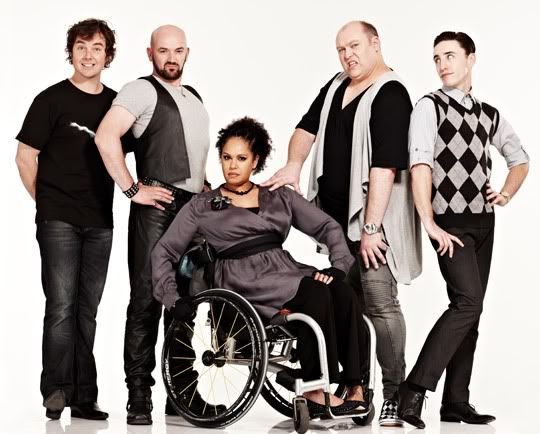(Over the next few days or, more likely, weeks--I'm not a timely person--I'm gonna be posting a paragraph or two, festooned with links, about all of the new albums I heard--and kept--this year, in alphabetical order, four or five at a time. I apologize for how shitty I am at writing about music. Most of these reviews will be very positive.)Laurie Anderson, HomelandAnderson's unlike-anyone-else musical style was already fully formed and perfect on her first (and, if only for that reason, best) album,
Big Science, in 1982. And it hasn't particularly changed since. Because I love her deeply and always will, this isn't particularly a problem; however, it does mean that I rarely find a reason to put on any of her other albums instead of
Big Science. The unfortunate effect is that extraordinary albums like this tend to get neglected. As usual, we get her melodically affectless spoken phrases, her oddly alternating quick-slow singing in bursts, her vocoder, her electronics, her violin, and her violin electronics, and as usual it just makes me love her in much the same way I imagine the crew of the
Enterprise loves Data, with an intense affection seemingly unjustified by the almost-cold presence of the affection's object.
"
Only an Expert" stands out as being obviously the single. It's perhaps a bit silly at times but nevertheless is an important song; one of the few works I think sincerely justify the use of the word "zeitgeist." "
The Beginning of Memory" is a myth (possibly coming from Aristophones? I have no idea) of just that: a lark flying around before the world was created doesn't have a place to bury her dead father (there being no earth yet), so she buries him in her own head, creating memory. In "
Another Day in America," over atmospherics intermittently interrupted by whistles and sub-bass and distant percussion, a pitch-shifted Anderson deeply intones an eleven and a half minute long stream of consciousness about American empire and the nature of time and reality, "and you know the reason why I really love the stars is that we cannot hurt them. We can't burn them or melt them or make them overflow. We can't flood them or blow them up or turn them out. But we are reaching for them. We are reaching for them."
Arandel, In DI haven't yet had a chance to listen to this one much, but I think that's going to change, and quick.
In D is minimal techno, with the addition of unsually large amounts of orchestration and wordless vocals. The atmosphere created, alternately pounding (
#9 has blaring horn-like synths and squealing flute-like synths and military march-like live drumming) and peaceful (
#6 sounds like something Eno would have done for one of his installations in the 90s, though the whispering towards the end is more unsettling than he normally chose to be at that point), is hard to describe but it sure does something to me. Aside from
#8 and
#3 (which come right at the end, basically) the
Terry Riley influence evident in the title is more implicit than explicit; Arandel allows the title to influence our experience of the album, making our ears shape this sound into something in the tradition of Riley--a shape that is there in the music, but needs the title to be picked out.
Erykah Badu, New Amerykah Pt. 2: The Return of the AnkhThe moment just before I listened to
The Return of the Ankh for the first time was probably the most exciting musical moment I had in 2010.
New Amerykah Part One (4th World War) was, if you ask me, far and away the best album of 2008 and is one of the very best albums of the past decade: experimental, political, clearly inspired by past strains of Afrofuturism but not constrained by them, passionate, exciting. When it became clear that the "Part One" in the title meant that there was in fact going to be a "Part Two" I was thrilled, and when the excellent promotional (non-album) single "
Jump Up in the Air (Stay There)" seemed to continue in the vein of the previous album
without any retread I could barely restrain myself.
The first time I listened to this album I was slightly disappointed--I had been hoping for further experiments in the vein of the first part, but in comparison to these expectations this album sounded like a return to the sound of
Baduizm all those years ago--which of course is not a bad sound; it just wasn't what I wanted. Further listens quickly dispelled this disappointment, however. I realized that, just as the fact that these songs are more personal doesn't make them any less political than the songs on
Part One, the fact that they're more conventional on the surface level does not, in fact, mean that they're conventional at all. Rather than hitting us up front with a frenetic explosion and spending the rest of the album skittering around in its aftermath, as she did in 2008, Badu here unfolds her genius slowly. She's comfortable with the basic sound, having first appeared on record with it almost fifteen years ago now, and by taking her time with it she is able to fully explore its possibilities, many of them never before realized. I'd be lying if I said I wasn't still hoping for another album picking up more directly where
Part One left off, but I'd also be an idiot if I said this album didn't, in its own, unexpected way, do just that. Possibly the best album of the year, again.
Belle & Sebastian, Write About LoveEmbarrassing as it is to recall, Belle & Sebastian were a huge comfort to me in high school. As a kind of wussy weirdo who subconsciously hated his snobby, dull friends but was too scared of everyone else to make new ones, well, it was lucky in a way that it was the late 90s, so I basically had a new Belle & Sebastian album to hang out with every year. I don't listen to them much anymore, but I still love those old albums, out of both habit and a genuine appreciation (they really are good albums, in their way). The later stuff, which I still always check out out of a lingering sense of obligation, is harder to deal with.
The Life Pursuit had at least a
few decent
tracks in amongst the bland mass of trying-too-hard; this one only has one. Opening track "
I Didn't See It Coming" is a lovely piece of hazy nostalgia with some nice electronic touches and production elements, and a pretty vocal melody delivered well by whoever the woman in the band is these days--which helps, because Stuart Murdoch has, at this point, become completely insufferable to me. The rest of the album is a soulless wreck, overproduced and unengaging, and it deserves the
Norah Jones guest spot it gets.
Big Boi, Sir Lucious Left Foot: The Son of Chico DustyHip hop and R&B have been among the very few genres to be reliably vital in recent years (drone and ambient are the only others I can think of right now), and it's because of albums like
this. I'm usually too white to know how to talk about them, but I do love to
listen to them. While everyone continues to shit themselves over Kanye fucking West, I'm much happier with
this.



